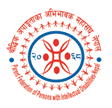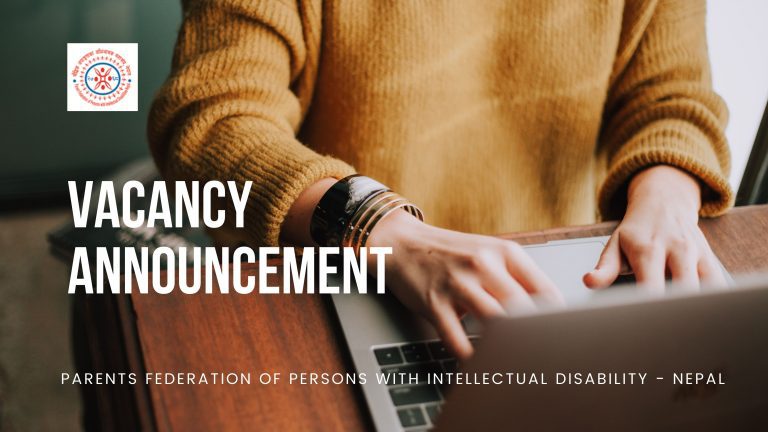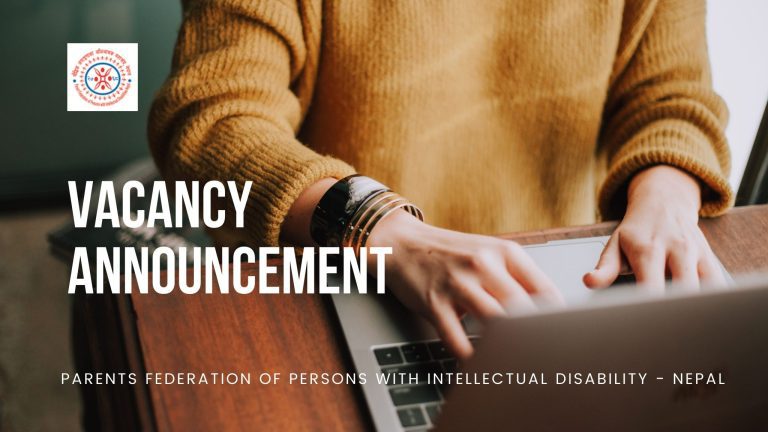Terms of Reference (TOR) for Consultancy: Enhancing Decision Making and Access to Social Justice for Persons with Intellectual Disabilities in Nepal
Title: Terms of Reference (TOR) for Consultancy: Enhancing Decision Making and Access to Social Justice for Persons with Intellectual Disabilities in Nepal
- Background: PFPID Nepal (Parent Federation of Persons with Intellectual Disabilities) is a national-level umbrella organization that advocates for the rights of persons with intellectual disabilities. Established with the goal of empowering individuals with intellectual disabilities, PFPID aims to ensure their recognition, participation, security, freedom, and full enjoyment of human rights. The organization operates in the field of intellectual disability, mobilizing self-advocates and legal representatives to lead campaigns and self-advocacy efforts.
- Challenges Overview:
Persons with intellectual disabilities in Nepal regarding access to justice and decision-making support face following challenges:
Legal Capacity and Decision-Making:
Persons with intellectual disabilities often encounter challenges related to their legal capacity. The ability to make informed decisions may be questioned, leading to limitations on their autonomy. Legal frameworks may not adequately recognize supported decision-making models, resulting in a lack of tailored support for individuals with intellectual disabilities.
Communication Barriers:
Many persons with intellectual disabilities face difficulties in expressing themselves effectively. This can hinder their ability to participate in legal proceedings, understand their rights, and communicate with legal professionals. Limited accessible communication tools and accommodations exacerbate this issue.
Lack of Awareness and Training:
Legal professionals, including judges, lawyers, and law enforcement officers, may lack awareness and understanding of intellectual disabilities. As a result, they may unintentionally discriminate against or misunderstand persons with such disabilities. Insufficient training on disability rights and inclusive practices contributes to this gap.
Stigma and Discrimination:
Deep-rooted societal stigma often marginalizes persons with intellectual disabilities. Negative stereotypes can affect their credibility as witnesses or litigants. Discrimination within the justice system may lead to unequal treatment, denial of rights, or exclusion from legal processes.
Inaccessible Physical Environment:
Courthouses, police stations, and legal offices may not be physically accessible for individuals with mobility challenges or sensory impairments. Lack of ramps, sign language interpreters, or easy-to-read materials further restricts their access to justice.
Complex Legal Procedures:
Legal processes can be intricate and overwhelming for anyone, but they pose additional difficulties for persons with intellectual disabilities. Understanding legal terminology, navigating paperwork, and adhering to deadlines can be daunting.
Limited Legal Aid Services:
Availability of legal aid services specifically tailored for persons with intellectual disabilities is limited. Access to affordable legal representation remains a challenge, especially for those from marginalized backgrounds.
Inclusive Legal Policies and Practices:
Nepal needs comprehensive legal reforms that explicitly address the rights of persons with intellectual disabilities. Implementing inclusive practices, such as easy-to-read legal materials, accessible courtrooms, and disability-friendly procedures, is essential.
- Significance:
The consultancy aims to empower individuals with intellectual disabilities by advocating for their rights and ensuring equitable access to justice, thereby contributing to their autonomy and overall well-being. Grounded in a human rights perspective, it aligns with international conventions such as the UNCRPD, emphasizing equal participation and non-discrimination. Through recommendations driving legal reforms, policymakers can shape disability-inclusive policies, while raising awareness among legal professionals fosters a more compassionate legal system. Community empowerment extends beyond legal processes, promoting social inclusion and reducing stigma. Multi-stakeholder collaboration, including PFPID Nepal, legal experts, and civil society organizations, amplifies impact and sets a positive precedent for other countries. Ultimately, the consultancy seeks to create an inclusive, rights-based society where individuals with intellectual disabilities can fully participate, make informed decisions, and access justice without barriers, embodying principles of equality, dignity, and empowerment.
- Objectives:
- Barriers Assessment: Conduct an assessment to identify barriers hindering access to justice for persons with intellectual disabilities in Nepal.
- Gaps Identification: Identify existing gaps in decision-making support mechanisms tailored to this population.
- Recommendations Proposal: Propose actionable recommendations aimed at enhancing access to justice and decision-making support for individuals with intellectual disabilities.
- Scope of Work:
- Intellectual Disabilities Analysis: Analyze intellectual disabilities and their implications for legal capacity within the context of Nepal.
- Legal procedure Examination: Examine the civil and criminal justice systems in Nepal, focusing on their accessibility and correct terminologies to define persons with intellectual disabilities.
- Legal Aid Services Evaluation: Evaluate the effectiveness of current legal aid services available to individuals with intellectual disabilities.
- Support Mechanisms Exploration: Explore support mechanisms such as guardianship and supported decision-making within the Nepalese context.
- Methodology:
- Literature Review: Conduct a comprehensive literature review encompassing existing research, legal provisions, and international best practices related to the rights of persons with intellectual disabilities.
- Court Decisions and Early established precedent: Investigate specific case studies to gain insights into real-life challenges faced by individuals with intellectual disabilities in accessing justice.
- Analysis: Conduct a comparative analysis to benchmark Nepal’s practices in align with the United Nations Convention on persons with Disabilities.
- Key Areas of Inquiry:
- Legal Capacity and Decision-Making: Investigate legal capacity and decision-making processes for individuals with intellectual disabilities.
- Challenges Encountered: Explore challenges faced by persons with intellectual disabilities in navigating the justice system in Nepal.
- Legal Aid Services Effectiveness: Assess the effectiveness of existing legal aid services in addressing the needs of individuals with intellectual disabilities.
- Support Mechanisms Adequacy: Examine the adequacy and accessibility of support mechanisms such as guardianship and supported decision-making.
- Deliverables:
- Executive Summary: Provide a concise overview of key findings and actionable recommendations.
- Detailed Report: Present an in-depth analysis of research findings, including challenges, gaps, and opportunities for improvement.
- Practical Recommendations: Offer clear and practical recommendations for stakeholders to enhance support for individuals with intellectual disabilities in Nepal.
- Annexes: Include relevant legal documents, case studies, and additional resources in annexes.
- Timeline: The interested individuals and consultancy firms are required to send in the proposal and the tentative budget within 19th March 2023. It is also requested to submit 2 reports of similar work along with the application.
- Qualifications
Education Background:
- A minimum of a Master’s degree in Sociology and Law is required.
- A Ph.D. in a related field, particularly with a focus on disability rights or social justice, is preferred.
Expertise in Disability Rights:
- In-depth knowledge and understanding of international and national disability rights frameworks, including the United Nations Convention on the Rights of Persons with Disabilities (UNCRPD).
- Familiarity with specific legislation, policies, and programs related to disability rights in Nepal.
Experience in Consultancy:
- Proven experience in providing consultancy services, preferably in the field of disability rights or social justice.
- Demonstrated ability to conduct research, analysis, and provide strategic recommendations for improving access to social justice for marginalized groups.
Understanding of Intellectual Disabilities:
- Comprehensive understanding of intellectual disabilities, including their impact on individuals, families, and communities.
- Ability to navigate the unique challenges faced by persons with intellectual disabilities in accessing justice systems.
Cultural Competence:
- Sensitivity to the cultural nuances and societal norms prevalent in Nepal, particularly concerning disability and social justice.
- Experience working within diverse cultural contexts and with marginalized communities.
Legal Expertise:
- Proficiency in Nepalese legal systems and procedures, especially those relevant to disability rights and access to justice.
- Ability to analyze legal documents, policies, and legislation to identify gaps and propose necessary reforms.
Research and Analytical Skills:
- Strong research capabilities to gather and analyze data related to disability rights and social justice issues in Nepal.
- Capacity to interpret findings and develop evidence-based recommendations for policy and practice.
Collaborative Approach:
- Demonstrated ability to work collaboratively with stakeholders from various sectors, including government agencies, NGOs, academia, and civil society organizations.
- Experience in facilitating workshops, meetings, and training sessions to foster collaboration and knowledge-sharing.
Commitment to Social Justice:
- Passion for promoting social justice and human rights, particularly for marginalized and vulnerable populations.
- Dedication to advocating for the rights and inclusion of persons with intellectual disabilities in all aspects of society.
- Contact Information:
Parents Federation of Persons with Intellectual Disabilities Nepal (PFPID)
Address: Devimarg, Naxal, Kathmandu
Phone No: 01-4516473
Email: info@pfpid.org.np


![[DEADLINE EXTENDED Till 17th June 2023] Opportunity for Consultant Service on Manual Development](https://pfpid.org.np/wp-content/uploads/2023/06/consultant1-768x506.png)


